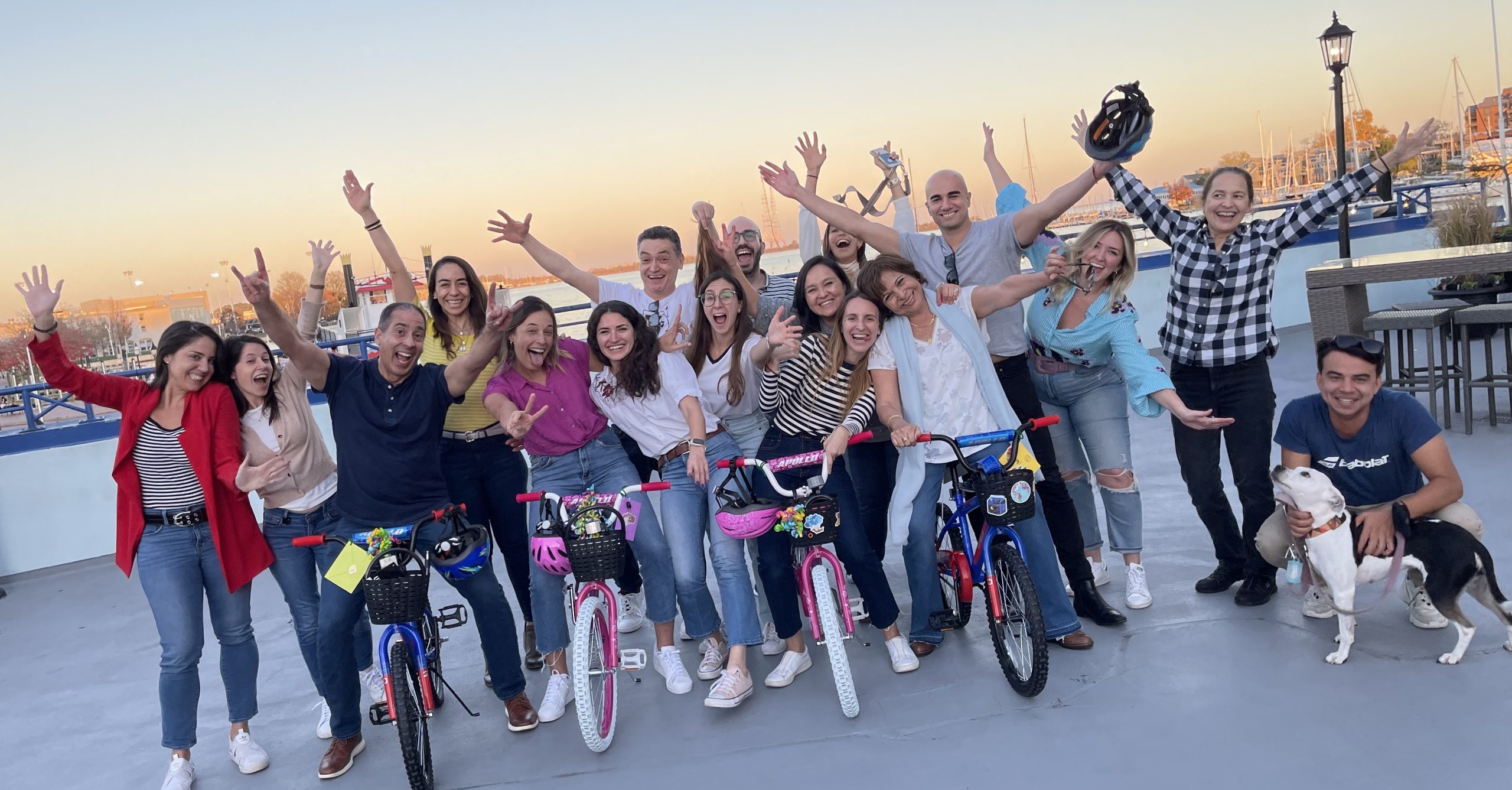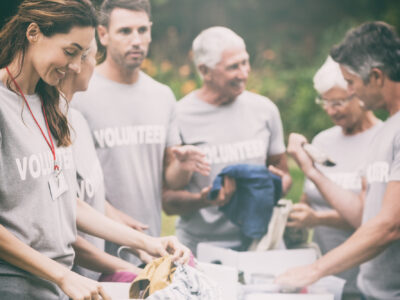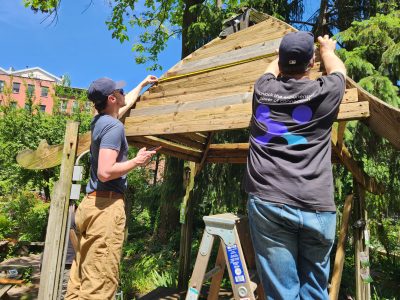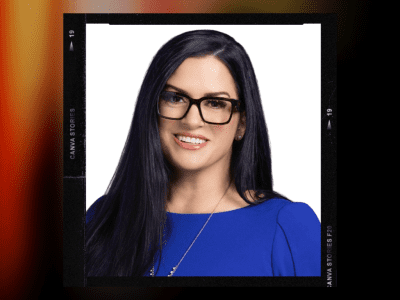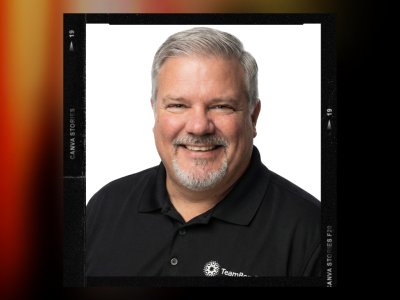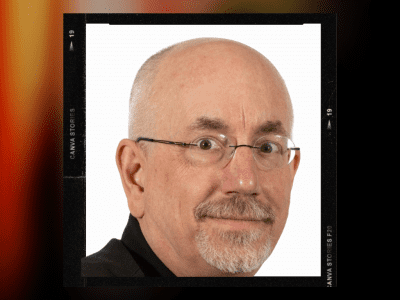STRONG TEAMS DON’T HAPPEN BY CHANCE 
Corporate Volunteerism in Action
w/ Steve Popper

Use the buttons above to listen now.
Transcript - Corporate Volunteerism in Action
Rich Rininsland: On this episode of Team Building Saves the World.
Steve Popper: Please don’t ask me too many questions ’cause I don’t know what I’m doing. But we’re gonna be packing lots of meals. The hunger problem in the United States has not gotten better.
Rich Rininsland: Right.
Steve Popper: And quite honestly, it’s gotten worse. You know, I took care of what my mom needed.
Okay? ’cause you always, no matter what, you have to do what your mom says, no matter how old you are. Well, the problem is I get bored, okay? And the reality is, Rich, we’re better than this.
Rich Rininsland: Hello team. It’s me. Your old friend, Rich Rininsland, host of Team Building Saves the World. And today I’m gonna skip my usual banter as we’re discussing the serious problem of food insecurity with the President and CEO of Meals of Hope, Stephen Popper.
But first, I have to share some love with all of my supporters at TeamBonding. If your team is ready to experience teamwork through the power of play, visit TeamBonding.com to learn more. Now, team, let’s talk about tackling hunger and how meaningful volunteer experiences can foster strong team building and corporate engagement with today’s guest, Stephen Popper.
Stephen Popper, thank you so much for coming on my friend. It’s so good to have you here.
Steve Popper: Thank you and for inviting me.
Rich Rininsland: You come from a really interesting background, comparatively speaking. Normally at this point, I would just ask you to tell my team all about you and how you got started, the business you’re in, but you actually got started in a completely different business.
You were a, I don’t wanna say lumber magnate…
Steve Popper: Well, certainly not a magnet. Right?
I spent 28 years in the wholesale lumber industry. And what I did was I went all over the world buying and selling lumber for, as I said, for 28 years.
Rich Rininsland: And now what made you decide to give all of that up and found Meals of Hope?
Steve Popper: So actually it was an interesting story of how I got started. So as I said, I was going all over the world buying and selling them. And I went to all the garden spots of the world, like Russia and the outskirts of China and all these things that the hotels were always either hopefully a one or one and a half star place.
So but travel all over and, i’m from a very close family and one day my mother called me up and said she, along with my aunts, were trying to take care of a very poor school in Haiti, and they found out that they really, the kids just couldn’t learn because they didn’t have enough to eat. And she had heard of a food program that from the Midwest and she basically said, “Hey, would you get some food to Haiti for me?”
And I kinda rolled my eyes and said, “mom, I’ve never shipped food, nor have I ever shipped containers to Haiti”, but, and she said, “yeah, well, but can you do it?” So you know how sometimes mothers can be sure. And I said, “mom, well, come to my office. Let’s talk about it.” Quite honestly, figuring that that was gonna be the end of the discussion.
But she came to my office, knew just a little bit about this program, and I’m from Southwest Florida in Naples, Florida. And realized that there was nothing like this in southwest Florida. So I said, well, let me do some exploring and contacted a number of people of, you know, if I can get this food and if it works great.
If it doesn’t work, can I send product back to the different manufacturers? And they said yes. And so I decided that I would do a meal packing event. I did that through the offices of the Rotary Club of Naples, who I’m been a member. And so for June and July of 2007, I went around to any organization that I could think of inviting them to a meal packing event on, I think it was August 17th or something like that and said, “please don’t ask me too many questions ’cause I don’t know what I’m doing. But we’re gonna be packing lots of meals.” And what ended up happening Rich, is we had 500 people show up. And we packed 135,000 dry, four to five meals.
Rich Rininsland: Fantastic.
Steve Popper: And it really, it really is amazing how in life, you know, one event can really change your life.
So I went back to my office after that wonderful Saturday, and I think my feet were about two feet off the ground and it was, okay, now what am I gonna do with all this food? Right? So I sent some to Haiti and called around and ended up calling our local Feeding America food bank. And I talked to the CEO.
He says, well, look, we’ll try it. No promises. They ended up picking up 108,000 of the 135,000 meals. And within a day he called me back and says, “okay, we’ll take as much as you can do.” Now, when that happened and my wife and I talked and we said, you know, the actual event was just an unbelievable experience of having these 500 people show up. For two hours. Packing all these meals and the experience and having this, the energy in the room of having all these people give back. And that’s what’s so good about what TeamBonding does is they bring people together. And that’s what we did. So we, we had the discussion that, gosh, 135,000 meals last Saturday.
Let’s see. If we can pack a million meals this year. Now my wife and I both run our, we’re running our business, our own businesses, but we said, how, how hard can it be? We packed 135,000, let’s pack a million meals. And sure enough, that first year we ended up packing over a million meals and with the caveat that we wanted all the food to stay local.
And that was the one thing that we found out after, you know, I took care of what my mom needed. Okay? ‘Cause you always, no matter what, you have to do what your mom says, no matter how old you are. Okay. But, you know, quite honestly, I didn’t know much about hunger in our community until after I did this.
But once I started doing it, then I realized that hunger is a major issue and it’s a silent epidemic in the United States.
So we packed over a million meals that first year, and I ended up basically doing it for about four and a half years, just for the heck of it. My partner, had a wonderful partner in the wholesale lumber industry, he wanted to retire. He was older than I’m. And after doing this kind of as, as part-time, just a fun hobby, feed people, what a great hobby… it was “Steve, you’d either need to buy me out or we need to sell the company.” And at that point I said, you know what?
Spent 28 years in the lumber industry. I’m having a blast doing this. It’s a heck of a lot more rewarding. Gee, do I feed people or let me tell you about the price on a two by four. Okay. So we ended up selling the company the proof of the proof of concept after four and a half years.
And I went in and kind of jump feet first into the meal packing of our nonprofit.
Rich Rininsland: So how many are you packing per year now?
Steve Popper: We’re packing probably about 15 million meals a year right now. We’ve packed over 115 million meals since we started. Mm-hmm. Of course, it started out very slow and, you know, as this, you know, ramping up.
But, you know, the other thing is we do our meal packing throughout the United States, but what’s interesting is, we took the, and really looked into hunger. And in southwest Florida, there’s not enough food pantries or there weren’t enough food pantries. Okay, so what we did was we started opening up food pantries and we now have 14 different locations that we serve people every week.
Quite honestly, I don’t know anywhere, anyone in the country that’s crazy enough, I mean, or smart enough to open up a chain of food pantries, basically. It’s a very expensive proposition, but our meal packing events help us do our food pantries in southwest Florida, so our mission is to feed people, wherever we’re packing food, the food stays in that community. The revenue comes back to Southwest Florida to help us with our food pantries and our other hunger related activities that we do.
Rich Rininsland: Very nice. Congratulations, man. What a huge success story.
Steve Popper: Yeah. So the moral of the story is no matter how old you are, you gotta still do what your mother says.
Rich Rininsland: Right? Good. Good. Oh God, my mother listens to this. I’m done now.
Steve Popper: Yeah, you’re in trouble. Yeah, you’re in trouble.
Rich Rininsland: But that’s okay. That’s okay. I’ve trusted the woman for 50 some years. I’ll continue to do so, you know? Right, right. She’s never led me wrong. Well, when I say never. Anyway, let’s move on. Talking about though the food insecurity, like what is it that you learned, what has this shift taught you about food insecurity that you know, makes it such a driving force for your life?
Steve Popper: Well, you know, I’m gonna be a little dry here and just share a little bit of statistics with you.
And what’s interesting is over the last 18 years, the hunger problem in the United States has not gotten better, and quite honestly, it’s gotten worse. So right now, if you look at the statistics that Feeding America states and Feeding America is the National Food Bank Network.
And there’s about a little over 200 Feeding America food banks throughout the United States. So they’re the largest food bank organization in the country. And that’s typically the organization that we give our meals to. So wherever we’re packing meals happens to be in Cleveland, Ohio, or Missouri, or, eastern Tennessee, wherever we’re gonna bring the food to the local Feeding America food bank.
Rich Rininsland: Okay.
Steve Popper: So the statistics that they say that is that 47 million people in the country face food insecurity. Of that one in five are children, which equates to 13 million kids that are food insecure. In the United States, 100% of all counties in the United States have a food insecurity problem.
Rich Rininsland: Okay?
Steve Popper: 100%. So more than 50 million people have gone to food pantries or food banks to receive assistance. And Rich, when I see that. It’s like, wow. It is just a mind blowing number. And so with our meal packing… there’s two wonderful outcomes of a meal packing. One is, and, and using TeamBonding’s name, that’s exactly what happens.
We bring people together and give them an opportunity to give back. What we found over the years is that people, if they’re given the opportunity, they wanna help other people, but most people don’t know how to go about doing that.
Rich Rininsland: Okay?
Steve Popper: So bring people together to give them that experience of bonding is one outcome.
And of course, the food that they produce is another. And when I say food, what we’re producing is we have eight different dried fortified meals that go to the food banks that go to food pantries and that people who go to the food pantries that receive, they typically add to boiling water.
Rich Rininsland: So let’s talk about the corporate side of all of this. I mean, let us say for example, that. You know, I might be a manager out there in the world somewhere and I’m thinking about an event that I need to get together for my people. Why do you think that your kind of event that this, you know, gathering of meals is something that I should be considering?
Steve Popper: A meal packing event is a perfect TeamBonding experience. And I say that for a couple of reasons. One. It is when we’re running a packing event, we go in, we set it up for the people. Typically, a packing event lasts no longer than two hours, so they open the door, their employees come in during that two hours.
It’s a high energy experience. Typically music is playing fast paced music. It becomes a bit of a competition quite honestly, very often ’cause we set up teams of about 10. So as one team competes against another, as they’re packing meals, there’s lots of interaction like, “come on, we’ve packed another box”.
And you know, and, and so there’s a bit of a, so, which is a, which is kind of neat. So the employees have a wonderful experience during that time period. For the manager, it’s excellent because that bringing people together, that bonding you know, and working together outside of the work that they do strengthens the morale and strengthens what’s going on within their company.
Rich Rininsland: Right.
Steve Popper: When the event is done, the manager knows it’s done because we then clean up and organize the shipping of the finished meals and of our equipment. So it’s a turnkey program. Their employees haven’t left the building.
So sometimes with certain activities, well, what should be a two hour activity ends up being a half a day because of transportation and what have you. But with meal packing, people come in, they have that wonderful experience and back at work within two hours.
Rich Rininsland: And can the client help decide where they believe the meals should go?
Steve Popper: Absolutely. So it is their event. So we typically say we want the food to stay local because so many people don’t realize the extent of hunger in the US. However, if they have a mission of saying, “gosh, we’d love to, you know, we’re a multinational company, and boy, it’d be great to send food to one of the countries that we work in”.
We can do that, and we have contacts so that people can do that or they can split the amount of meals. Some go overseas, some stay local. The other thing that we do Rich, which I think is really important, is that on every bag that they pack, we put a lot number and expiration date for food safety on it.
But what we also do is we put on there packed through the generosity of x, y, z company. Now, the company’s not necessarily doing that because they want the exposure. However, if they made an effort to feed people, people within the community should know who’s helping them. So we do that on every packing event.
And I think that’s a really important value, this non-monetary value that we bring to a meal packing book.
Rich Rininsland: But why volunteering? I mean, just in general, not even for a corporation, but why do you think people should be, you know, there are gonna be people out there who, they themselves don’t believe that they’re at risk of food insecurity.
Steve Popper: You know what? Volunteering… that question is an interesting question. Because if you look at it not just for. Food. Right. And hunger. But the just why volunteer?
Rich Rininsland: Yeah.
Steve Popper: I think you’ll find that one, it makes people a, generally a happier person. As they’re giving back to people, you know, that golden rule, if you’re nice to me, I’ll be nice to you.
And you know what? I think most people can empathize and say, “gosh, if I was in that position, I would hope someone would help them.” But honestly, when you come and look at hunger very often, I hate to say it, within the organization that you’re, that are packing. There may very well be people that are facing food insecurity themselves .
Typically the people that come and receive our food are not homeless, but there are homeless people that get our food.
Not necessarily unemployed,
But the real client that you find Rich is what we call the underemployed. These are people that are working hard, may have one or two jobs, but the reality is that what they’re making with those one or two jobs just isn’t enough to cover their expenses. You know, so many people in the United States live right on the edge and it’s a sick child that could cause them to miss work for a week or two. And makes them go into that downward spiral. It could be a problem with their automobile, it could be so many different things.
The cost of housing has done nothing but go up across the country. So, the people live on the edge, but giving back volunteering is such an important part of our society. It helps, it teaches us to be a better society.
You know, we work with a lot of students and what we have found is that culturally there are a lot of groups that giving back is not part of their culture.
But when they learn to give back, they realize, and hopefully this brings a flywheel effect that, ” gosh, I participated at my business at this wonderful team building experience. That was awesome. You know what, I wonder what else I can do in my community.”
And, so it’s kind of like by volunteering and having a great experience, and that’s what’s so good about working with TeamBonding and Meals of Hope is that all these packing events are wonderful experiences. By doing that, the idea is that a rising tide lifts all ships. Well, gosh, that was so good. That two hours. Shoot, what’s two hours? I could find another two hour thing. Well, maybe I’m going to go work and volunteer at a shelter or at, at the local animal shelter. Let alone a person shelter. You know, it doesn’t matter what you’re doing.
The idea is have that wonderful experience and hopefully it brings you up and want to do it again and again and again.
Rich Rininsland: Plus, if there’s one thing I’ve learned over the six years I’ve been doing this podcast, the later millennials into this new generation of workers who are coming in, one of the first things they ask nowadays is, what does your company do to give back to the community at large? And yeah, I think if your answer is nothing, they’re not gonna wanna come work for you.
Steve Popper: Right. And I think a lot of businesses realize that they have a responsibility not just to sell a widget, but how they’re also going to, you know, what kind of corporate stewardship they’re doing in the community.
Rich Rininsland: So tell me if you can, how is it that. How did you come to build this, to make it what it is today? I mean, it is a non-for-profit. You are a non-for-profit organization.
Steve Popper: Absolutely. Not only are we a not-for-profit organization, we’re a very efficient nonprofit. So as any nonprofit, our financials are available and, you know, and, in that… transparency is so important in a nonprofit, but we have audited financials and our last audited financials showed that 93% of our expenses were program related.
So we’re very efficient nonprofit, so that’s important.
But so how so how did I go from being, “Hey, let’s pack a million meals” to packing over 15 million meals a year and having 14 and all across the country.
And well, the problem is I get bored. And it’s like, “well, if I’m gonna do it, then let’s see how big we can do it”. And Rich, quite honestly, it was interesting ’cause years ago when I started this and after doing it for one or two years, I had people say, “okay, well now that you this, are you gonna, are you gonna continue?” And I looked at him, I’m like, “what do you mean? Am I gonna continue?” This is still doing this as a hobby. But of course I’m gonna continue because using those statistics, there’s 47 million people in the United States that are hungry.
Rich Rininsland: Yeah.
Steve Popper: Yeah. Well, when you start to learn this, you almost feel, you know, a sense of obligation. We have a program that feeds people, but brings these wonderful experience to the people that help produce the food.
Rich Rininsland: Right,
Steve Popper: i’ve had people say, “well gosh, you have all these dried four to five meals. Why don’t you just do ’em through a factory?”
Rich Rininsland: Hmm.
Steve Popper: I go, “if I did that, I’d lose that whole experience of having people learn to give back.”
Rich Rininsland: Yeah.
Steve Popper: And our model would completely fall apart.
Rich Rininsland: Plus, I mean, the one thing we learned over the pandemic, you’re talking about 13 million children going hungry across the contiguous United States.
One thing we learned over the pandemic when they were talking about making sure that kids, when schools finally opened again, were still getting the meals that they required because for how many, even in New England where I’m from, the percentage of children who count on that as one of their only really truly nutritional sources of food is staggering.
Steve Popper: Right. So Rich, give me an example. Where in New England are you? Just outta curiosity?
Rich Rininsland: I’m in southern Massachusetts. I’m in the burbs outside Boston.
Steve Popper: Okay. So we work very closely with Greater Boston Food Bank as an example. Mm-hmm. And some of the statistics that they have. Our, they really mirror exactly what the national pro stats are.
Rich Rininsland: Yeah.
Steve Popper: Our meal packing meals are given typically to the food bank. They’re given to the food pantry, and then the food pantries go out to individuals. There are programs called backpack programs and I dunno if you’re familiar with that.
Rich Rininsland: Sure am.
Steve Popper: And we do, in southwest Florida, we do over 10,000 weekend backpacks a month in some of the local school systems.
But a backpack program, the idea is that they are, the school has identified children that are so food insecure that they need to have the food for the weekend. And what happens is if you’re not careful, the idea of doing that works out great.
But in reality, what happens is that the child gets on the bus and either they start eating as much as possible because, if they are that hungry, the rest of the family’s hungry.
Rich Rininsland: Yeah.
Steve Popper: Or they get home and they say their caregiver says, “oh, thank you very much.” And “I’m taking that and we’re dividing it up for the rest of the family.”
So our backpack program, at least in southwest Florida, and we see this in other parts of the country where the food banks use our Meals of Hope meals as a supplement to these backpack programs. Because it just layers right on top of that. So the child has the food for the weekend, but also and, and each bag of Meals of Hope meal, depending on which recipe we’re doing either has six meals or eight meals per bag. So the family has something as well. But, you know, I hate to say it, Rich. I’ll use myself as an example, when I was a kid and summer vacation came around or vacation, it was like, ” I can’t wait to, to have vacation.”
Rich Rininsland: Yeah.
Steve Popper: But the reality is 13 million kids when vacation comes around, instead of having that wonderful release, of like, “I’m on vacation.”
Instead, it’s a time of anxiety because they rely on breakfast and lunch in so many schools across the country that kids need. And those become such an important part of their daily nutrition so that when school’s over, then food insecurity becomes even a bigger problem.
Reality is, Rich, we’re better than this. And that’s really what it comes down to. We are better than that. And bringing a TeamBonding experience to a business and have such a huge impact. Is just so important. And during a meal packing be, just to give you a number… a hundred to 120 volunteers can pack 50,000 meals in two hours. So the impact of a two hour experience of just a hundred, 120 people is 50,000 meals.
I was talking to a food bank yesterday. In Washington DC we had a program that we did over a five week period where kids came to DC on a leadership program.
And at the culmination of their week, they did a meal packing. And we packed 350,000 meals. It got over about five weeks. Not quite I guess about six weeks ago, the program stopped for the summer.
Rich Rininsland: Right.
Steve Popper: And I asked her yesterday, she said, oh yeah, the 350,000 meals that you guys gave to the food bank, they’re all gone.
Rich Rininsland: Of course.
Steve Popper: So when we do a meal packing event. The food banks are so grateful for it. But the impact, a hundred, 120 people packing 50,000 meals, 2000 people could pack a million meals in two hours. So when you’re talking to businesses, we can very easily take a TeamBonding experience right from 20, 25 people to thousands of people and give them all that great experience, which is so important as, you know, it’s kind of like right hand of the problem. And then the left hand is the act is the outcome of all these meals. So we’ve run packing events literally and packed, you know a million meals in two hours and 15 minutes before.
Rich Rininsland: Plus, we’re still gonna make it fun for the people doing it.
Steve Popper: Absolutely. And actually the larger the group packing, the more fun people have.
Rich Rininsland: Nice. Very nice. Steve, let me just ask you, I mean, from what you have seen, your experiences across the country, not only in your own state of Florida, how do we make this better?
I mean, is it something that we are all going to have to do? Can it only be done by grassroots or is there something beyond just hiring you or hiring TeamBonding and doing a food packing facilitation that we can do to start improving these numbers?
Steve Popper: Well, unfortunately, and not to bring politics into the discussion, but right now food assistance is being cut. So the demand for food assistance or, the need for food assistance is doing nothing but growing.
Rich Rininsland: Okay.
Steve Popper: But at the same time, you know, we’re all entrepreneurial. We’re all trying to help and give. And as long as we’re letting people know how to help, I think people wanna help people.
And I really don’t think that at the same time, even though there’s all these cuts that have been announced for food assistance, I do think that it’s the responsibility of everyone to try to help everyone. It’s not, it can’t just be the governments shoulders.
Rich Rininsland: Right.
Steve Popper: So, and I think most businesses realize that giving back is good business.
Rich Rininsland: Perfectly said. Steve, let me just ask you, how can my team out there find out more about you? How can they help you? You know, is there a way beyond taking part in an event that they can reach out to Meals of Hope?
Steve Popper: Well, certainly they need to contact their TeamBonding rep because they know how to bring it to their business.
So that’s the, that’s the first step. Of course, they can find out all they want about Meals of Hope by going to mealsofhope.org, and we have a website and all sorts of, lots of information and as good stewards to anyone, you know. Check out your nonprofit, who you’re dealing with, what goes to the programs?
Are they good stewards of the investment that you’re making? So, certainly Meals of Hope is that way. But honestly, the first step is to contact your TeamBonding person and discuss with them what your needs are. How many people are you looking to engage? Over what time period.
The question, you know, “gosh, we have a, an upcoming sales conference and we didn’t realize that no one organized any kind of activity and it’s in 10 days, can you do it?” And the answer of course is yes, because Meals of Hope says no to nothing at all. And we just moved into a new warehouse and we’re debating putting a big sign on one of the walls that know is a four letter word.
So that’s how you get started. But we’d rather you do a small event as opposed to nothing, because small events turn into larger events.
Rich Rininsland: Yeah. And every bit helps!
Steve Popper: And get out there, bring an event to your employees and see the experience of them giving back and the power of that.
Because it translate more than just that two hour time period. Or an hour and a half, whatever time you have for that. But ’cause that experience go and lives on after afterwards and makes for better employees, makes for better companies, and makes for better community.
Rich Rininsland: Fantastic. Steve Popper, everybody.
Give him a big round of applause, my team.
Steve Popper: Rich, you gotta give me that tape so I can give that to my wife…
Rich Rininsland: Oh, absolutely. Yeah, yeah, yeah. That I don’t go anywhere without this. Now this soundboard like lives with me. But Steve, I gotta tell you, I looked at the clock and I was like, “I can’t believe we’ve been talking for as long as we have.”
Steve Popper: Well, ’cause I can’t keep my mouth shut. That’s the problem.
Rich Rininsland: No, and it’s also because of how vitally important this topic is. I mean, I would love to have you back to talk more about this at a later date to see how successful everything has been for you. Continue to be great.
Steve Popper: I’d love to come. I’d love to come back anytime.
Rich Rininsland: But I hope you continue to feel that way because you might not remember, but it’s time for my speed round.
Steve Popper: Yes, and I’m not clever about these things, so this could be the hardest part of this whole interview.
Rich Rininsland: So just to remind you, my friend, this is gonna be 60 seconds.
I’m gonna play some music that’s gonna remind me of the time as we play along. But in that 60 seconds, I’m just gonna ask you a bunch of silly questions about you. The objective, of course, is to try to answer as many as you can within that 60 seconds. If you are feeling at all competitive.
We have hit 17 questions. Asked and answered within that 60 seconds, you feel like you’re up to it.
Steve Popper: Go for it.
Rich Rininsland: Don’t worry about it. If you can’t get 17, we’re just gonna have fun with it. That’s really the whole point of all this. It’s a game. Okay, Steve, as soon as you hear the music, I’m gonna ask the first question.
Let’s have some fun.
What’s your name?
Steve Popper: Steve.
Rich Rininsland: How many kids do you have?
Steve Popper: Three.
Rich Rininsland: Which one’s your favorite?
Steve Popper: None of them.
Rich Rininsland: Do you have any pets?
Steve Popper: I have a dog and a cat.
Rich Rininsland: Who is the funniest person, you know?
Steve Popper: My wife.
Rich Rininsland: What is your favorite guilty pleasure television show?
Steve Popper: Game of Thrones.
Rich Rininsland: Okay. Favorite go-to summer vacation spot?
Steve Popper: Bayview, Michigan.
Rich Rininsland: What job would you be terrible at?
Steve Popper: Being a chef.
Rich Rininsland: If you could work anywhere in the world, where would it be?
Steve Popper: Doing what I’m doing Southwest Florida.
Rich Rininsland: Nice. What’s the most embarrassing thing in your music library?
Steve Popper: I listen to NPR, so my music library is very limited.
Rich Rininsland: Pancakes are waffles.
Steve Popper: Pancakes.
Rich Rininsland: What was your first job?
Steve Popper: I worked at an underwater bar serving drinks at 12 years old.
Rich Rininsland: How do you serve drinks underwater?
Steve Popper: It was an underwater bar and I would bring it down. Damn killing time here. But that’s…
Rich Rininsland: No, no, it’s okay. The music has stopped. I’m just curious. Now you got 13 my friend. That’s okay. That is actually a little better than average. So well done.
Steve Popper: That’s good. And I like waffles better than pancakes to be honest with you.
Rich Rininsland: Well, thank you for clarifying Steve Popper. Thank you so much, man. I look forward to seeing you again.
Steve Popper: Thank you very much.
October 29, 2025
What do lumber and fighting hunger have in common? In this episode, Steve Popper reveals how a 28-year career in the wholesale lumber industry unexpectedly led him to launch Meals of Hope, an organization that has now packed over 115 million meals.
You’ll hear how one small request from his mom turned into a movement powered by corporate volunteerism and community spirit. From high-energy meal-packing events to the impact of corporate volunteer programs, Steve explains what corporate volunteerism is and why it’s one of the most powerful ways companies can boost teamwork while making a real difference.
Steve also touches on the partnership between Meals of Hope and TeamBonding through our Meal Pack Give Back event, showing how these experiences combine service and team building in a meaningful way.
If you’ve ever wondered how volunteering can bring employees closer together—or why giving back could be the ultimate team building activity—you won’t want to miss this story. Tune in and discover how serving others can transform not just communities, but your workplace too.
About Stephen Popper
 Stephen Popper is the President & CEO of Meals of Hope, the largest food pantry operator in Florida. After nearly three decades as a principal in the wholesale lumber industry—where he built one of the largest import businesses of European/Russian lumber and global hardwood products into the U.S.—Stephen shifted his focus to tackling hunger.
Stephen Popper is the President & CEO of Meals of Hope, the largest food pantry operator in Florida. After nearly three decades as a principal in the wholesale lumber industry—where he built one of the largest import businesses of European/Russian lumber and global hardwood products into the U.S.—Stephen shifted his focus to tackling hunger.
Since founding Meals of Hope in 2007, the organization has packed more than 115 million meals nationwide, mobilizing volunteers of all ages to combat food insecurity while experiencing the joy of giving back. He lives in Southwest Florida with his wife, Charissa, and is a proud father of three sons and grandfather to one.
If you're given the opportunity, people want to help others, but don't know how to go about doing that. Corporate volunteering brings people together to give them that experience.
Steve Popper
More great podcast episodes.
Season 7 | Episode 1
The L&D Approach That Actually Works
Season 6 | Episode 18
That’s a Wrap!
Season 6 | Episode 17
Work-Life Integration
Season 6 | Episode 16
Laughing it Off
Season 6 | Episode 14
Collaborative Play at Work
Season 6 | Episode 13
The Science of Supportive Workplaces
Season 6 | Episode 12
The Power of Being Present
Season 6 | Episode 11
The Age Advantage
